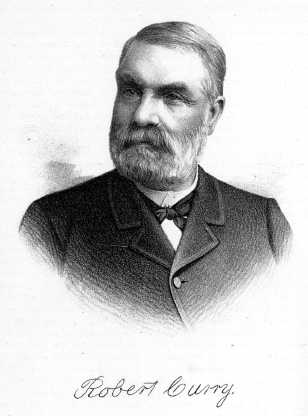 OBERT
CURRY, A. M., Ph. D., second son of Robert and Kezia
Curry, was born near Murrysville, Westmoreland Co.,
Pa., on the 8th of June, 1821. In his ninth year his
parents removed to Washington County of the same
State, where he was raised, and trained to habits of
industry. OBERT
CURRY, A. M., Ph. D., second son of Robert and Kezia
Curry, was born near Murrysville, Westmoreland Co.,
Pa., on the 8th of June, 1821. In his ninth year his
parents removed to Washington County of the same
State, where he was raised, and trained to habits of
industry.
His opportunities for obtaining an
early school education were very meager, as his
parents, although honest, industrious and intelligent,
were in limited circumstances. This want of
opportunity, however, was offset to a certain extent
by his early home education, as under the guidance of
his parents, who were Presbyterians of Scotch
extraction, he had learned to read and write, and
treasured up in memory the Westminster Assembly's
shorter catechism, and many psalms and hymns, and
other choice selections of prose and poetry, further
back than at his majority he could remember. His
instructions in the Sunday-school, and from the pulpit
also, formed an important part of his early education,
and doubtless had much to do in shaping his character
and forming his purposes for life.
He early manifested an ardent desire
to obtain a liberal education, and in the meantime, by
his own unaided home efforts, supplemented by a few
months' instruction in the public schools of his
neighborhood, gained such a knowledge of the common
branches of an English education as enabled him to
pass a satisfactory examination before an intelligent
school committee, from which he received such
certificates and recommendations as justified him in
applying for a position as teacher in the public
schools, and henceforward relied entirely on his own
efforts for support and success in securing an
education.
After teaching a few terms in the
public schools, he became a student in the academy at
Frankfort Springs, Beaver Co., Pa., where he made
considerable progress in the study of mathematics and
the Classics. Subsequently he attended an academy in
Cross Creek Village, Washington Co., Pa., devoting his
time while there exclusively to the study of the Latin
and Greek languages. In the summer of 1845 he entered
the Freshman class of Jefferson College, where he
graduated in 1848, having taught more or less in the
meantime.
After graduation he taught one year
in the Hays McNary school, and on Dec. 26, 1849, he
and Miss Mary McCloy, youngest daughter of Dr.
Alexander McCloy, of Cannonsburg, Pa., were united in
marriage.
He subsequently held successively
the principalship of the West Newton Academy, the
Cannonsburg graded schools, and that of a private
seminary in West Manchester. In the spring of 1855 he
organized, at Mansfield, Pa., the first Normal School
west of the Alleghany Mountains. In the fall of the
same year he became Principal of the New Brighton
Female Seminary, in which position he remained until
his wife died, in the fall of 1859, when he, with his
little daughter, an only child, returned to
Pittsburgh, where for a time he edited and published
an educational journal, known as the National
Educator.
In 1860 he founded the celebrated
Curry Institute, of Pittsburgh, Pa., an institution
which still bears his name, and which, while
comprising three courses -- Normal, Classical and
Commercial -- was nevertheless designed for the
special education and training of teachers. It was a
private enterprise, which, while demanding high prices
for tuition, had to compete with the Pittsburgh
Central High School, which comprised a Normal
Department free to all its pupils. Curry Institute
opened with only four students, but grew so rapidly
that by the end of the first year it numbered over 200
students. Its popularity increased from year to year,
until before long there was a constant demand for all
its graduates as teachers, and indeed all its other
students who could obtain certificates of any grade.
During his thirteen years' connection with the
institution as Principal, its average annual
attendance was over 317 students, while toward the
last of that period, some of its catalogues show an
annual enrollment of over 500 students.
In the spring of 1873 he was
appointed Deputy State Superintendent of Public
Instruction in Pennsylvania, and as his thirteen years
of unceasing labor in building up and carrying on his
school had somewhat impaired his health, and as in the
meantime his little daughter had died, thus leaving
him alone, he disposed of his interest in the school,
accepted the proffered office, and entered upon its
du-
|


